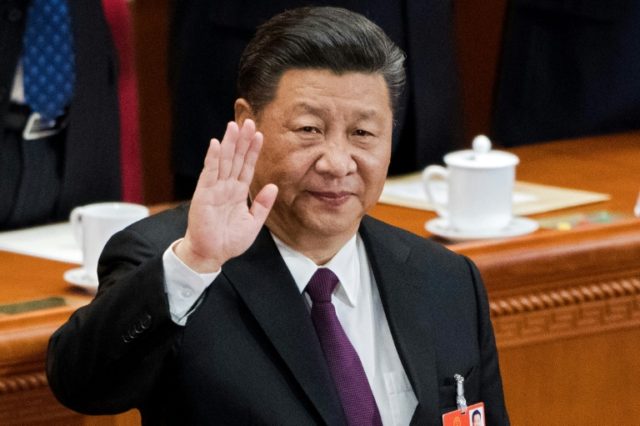Chinese Communist Party leader Xi Jinping welcomed a delegation of high-ranking officials from North Korea on Wednesday, who reportedly visited Beijing to observe how China transitioned from a closed-off repressive communist state to its modern form—a repressive communist state profiting from business with major multi-national corporations.
The Chinese state news outlet Xinhua published photos on Wednesday of Xi welcoming “a friendship visiting group of the Workers’ Party of Korea (WPK)” to a meeting in Beijing. Prior to the meeting taking place, the Chinese Foreign Ministry informed reporters that China invited the group to visit “as a concrete step to implement the important consensus reached between General Secretary Xi Jinping and Chairman Kim Jong Un.”
“The visiting group will make some tours to learn about China’s achievements in economic development and reform and opening-up and promote an exchange of views between the WPK and the CPC on state governance,” Foreign Ministry spokesman Lu Kang noted.
South Korea’s Joongang Ilbo reported on Wednesday that the North Korean officials visited Beijing’s Zhongguancun neighborhood, which the newspaper described as “China’s Silicon Valley.”
“Observing China’s socialist economic system and exchanging experience about ruling the state was an important goal of the Workers’ Party officials’ visit,” an unnamed “source familiar with North Korean affairs” told Joongang. “They want to learn from China’s experience in maintaining a strong one-party Communist system while carrying out economic reform.”
According to the South Korean newspaper, this particular delegation will stay in China for a week and also “observe provincial and city governments and discuss economic cooperation with Chinese officials.”
The delegation’s stay is the latest such exchange between North Korea and its closest ally and largest trading partner, China. Dictator Kim Jong-un made Beijing the destination of his first ever trip outside of the country as head of state in March, where he declared that he and Xi had heralded in a “spring full of happiness.” Kim made a second trip to visit Xi last week, a surprise one-day trip in anticipation of a scheduled meeting between Kim and U.S. President Donald Trump on June 12.
Chinese Foreign Minister Wang Yi visited Pyongyang shortly before Kim visited Dalian on his second trip to China, another sign that China is willing to make its top diplomats available to Kim so long as he remains loyal to Beijing.
As North Korea’s largest trading partner, China has the most to gain by the creation of economic opportunities for international companies in the rogue state. In anticipation of this, China’s state media reports that rent prices in the border city of Dandong “have nearly doubled since March,” when Kim made his first visit to China and the White House announced a plan to meet with Kim. Big-city buyers are reportedly triggering a “frenzy” of property purchases, hoping to cash in on the potential economic development occuring on the other side of the Yalu River following Kim’s meeting with Trump.
While the countries have had their public disagreements – North Korean state media referred to China as a “vassal” of the United States after China signed on to global sanctions against Pyongyang last year – China has been the most vocal voice on the world stage calling for international investment into enriching the Kim regime.
“Quick nuclear abandonment by Pyongyang is certainly a welcome thing. But such a sharp change could take place only if the US offers Pyongyang attractive rewards,” Chinese state newspaper Global Times proposed in April. The United States, it argued, must pay Pyongyang to create “strategic mutual trust” between the two countries.
As part of a joint declaration with leftist South Korean President Moon Jae-in, China urged that the United States “must actively take part in ensuring a bright future for North Korea through a security guarantee and support for its economic development.”
U.S. Secretary of State Mike Pompeo has confirmed that the Trump administration is open to providing economic aid to North Korea so long as Pyongyang agrees to a full denuclearization process. That demand has caused strife on the North Korean side, which announced on Tuesday it was reconsidering the possibility of a Kim-Trump meeting in light of comments by National Security Advisor John Bolton that the administration would like to see a complete, Libya-style nuclear disarmament in North Korea.
“We’re still hopeful that the meeting will take place and we’ll continue down that path,” White House Press Secretary Sarah Huckabee Sanders said in an interview Wednesday.

COMMENTS
Please let us know if you're having issues with commenting.